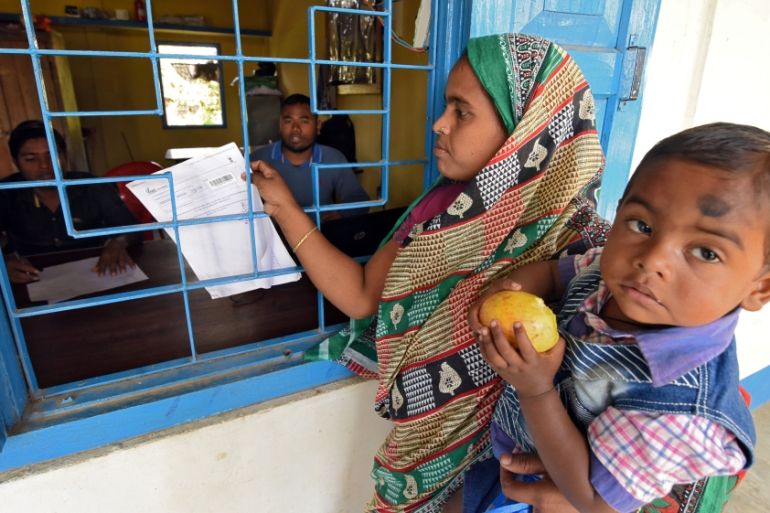What’s next for the 4 million stripped of citizenship in India?
After declaring four million people ‘illegal’, Al Jazeera takes a closer look at controversial draft citizenship list.

India has effectively stripped four million people in Assam of citizenship, sparking fears of mass deportations of Muslims from the northeastern state.
But authorities assured that those who could not make it to the draft list will not face “immediate deportation or be arrested”. People will be given time to file for corrections, Indian officials said.
Keep reading
list of 4 itemsBiden labels Japan and India ‘xenophobic’ along with China and Russia
After deadly attack, Russia’s Central Asian workers report rising racism
‘Feel less and less like playing’: Vinicius Jr in tears over racist abuse
The definitive list will be announced in December.
The National Register of Citizens (NRC) published its final draft of citizens on Monday, and ruled that of the 32.9 million population of the state, only 28.9 million names were included in the final draft.
The right-wing Bharatiya Janata Party (BJP) of Prime Minister Narendra Modi came to power on the promise to expel the so-called “illegal foreigners” and protect the rights of indigenous groups.
Critics say the move to strip the citizenship of Bengali origin people, most of whom are Muslims, is similar to Myanmar’s removal of rights and protections for its Rohingya community. Muslims form one-third of the state’s population.
What is the NRC list and who can be included?
Unique to Assam state, the NRC document was prepared in 1951 to distinguish Indian citizens from undocumented immigrants from what was then East Pakistan (which later became Bangladesh in 1971).
The cutoff date to be eligible for Indian citizenship is March 24, 1971, as per the Assam Accord signed in 1985.
The people or their descendants whose names appeared in the NRC 1951, or in any of the electoral rolls up to March 24, 1971, or in any of the other recognised official documents issued up until midnight of the same period should be included in the final draft.
Assam has witnessed prolonged protests against so-called foreigners, which includes both Hindus and Muslims.
The arrival of millions of refugees to Assam in 1971 – when Bangladesh seceded from Pakistan after a bloody civil war – brought the issue of these so-called foreigners into national focus.
It ignited Assam’s biggest and deadliest anti-foreigners agitation between the late-1970s to the mid-1980s. About 2,000 Muslims, including children, were massacred in a single day in Assam’s Nellie village in 1983 at the height of the anti-foreigners agitation.
The Assam Accord, which was signed between the government and the protesters, was able to bring a consensus on the eligibility criteria for citizenship.
What happens to those who aren’t on the list?
Assam Chief Minister Sarbananda Sonowal said that the Indian citizens whose names are not included in Monday’s list need not worry.
“They will get adequate opportunities to file claims and objections pertaining to their rights,” Sonowal wrote in a post on Twitter.
NRC Coordinator Prateek Hajela said that people can apply for these claims, objections and corrections from August 30 to September 28.
“If their names are not in the final draft, it doesn’t mean that these people are illegal,” Hajela told Al Jazeera.
“This is just a draft and I’m telling you that these people will be given ample opportunities for claims and objections. So, there is no reason to fear.”
Aman Wadud, who practices at Guwahati High Court, said that people will get a chance through the claims and objection process.
“This is only a draft, not the final NRC. No one is becoming stateless. No one is becoming a foreigner. There is nothing to be worried about,” he said.
“But I believe most of the people who have been dropped, will be included. You have cases where one sibling is there and the other isn’t. The parents’ names are there, the children’s names are not. Husbands’ names are there, their wives are not. Why this has happened – the NRC will answer.
“But as of now, this draft does not render anyone stateless.”
Will the NRC resolve the citizenship issue?
Activists and experts say the NRC process is not likely to solve the contentious citizenship issue as tens of thousands of people who have been marked as “Doubtful” or “D” voters, their descendants and those With pending cases in the Foreigners’ Tribunal are not being considered by the NRC authorities.
India’s Election Commission introduced the concept of “D” voters in 1997 under which a person’s citizenship rights are stripped.
There are around 125,000 “D” voters and more than 131,000 cases pending in the Foreigners’ Tribunal.
In many cases, earlier documented by Al Jazeera, people have faced harassment and discrimination, with several individuals falsely marked “D” voters or declared foreigners.
Under the BJP government, which came to power in 2016, some 15,000 people were declared foreigners last year alone – which means more than 1,000 per month.
Around 90,000 people were declared foreigners between 1985-2016.